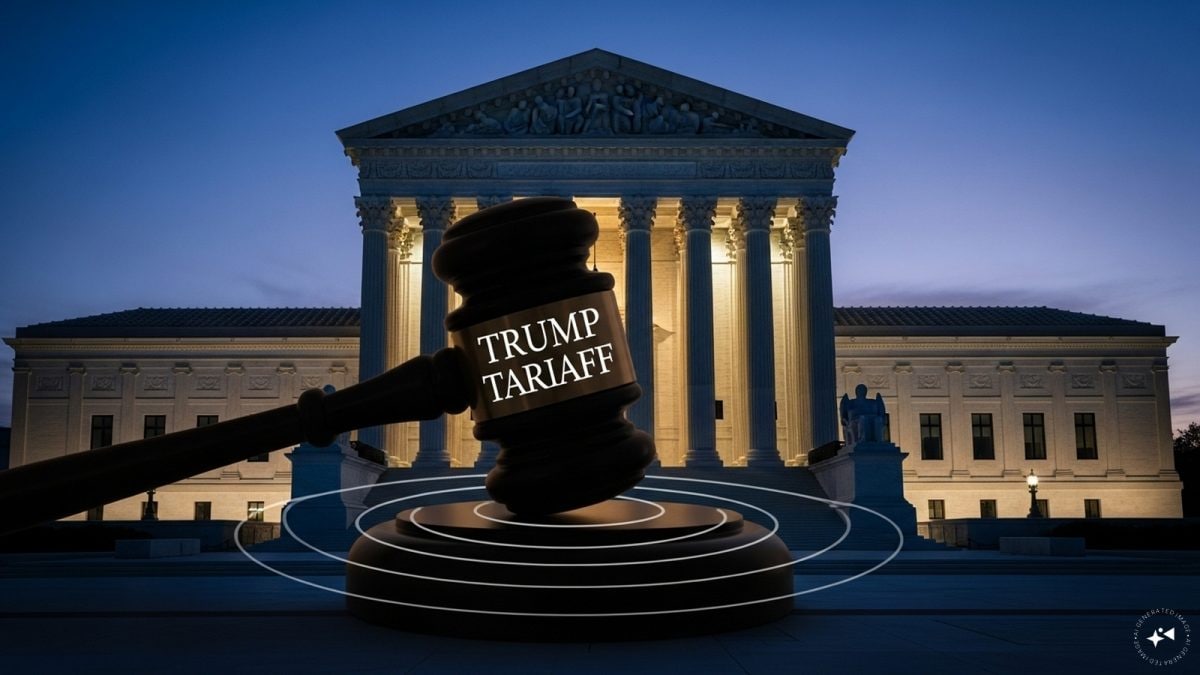World
Tariff Revenue Hits $165 Billion: A Double-Edged Sword for U.S. Budget

The U.S. Treasury has received an unexpected boost of $165 billion in tariff revenue for the fiscal year 2025, primarily due to tariffs imposed by President Donald Trump. However, a pending Supreme Court case threatens to undermine this financial windfall, raising questions about the sustainability of the U.S. budget strategy.
The surge in tariff revenue marks a significant increase of $95 billion compared to the previous year. Much of this revenue comes from tariffs enacted under the International Emergency Economic Powers Act (IEEPA), which Trump utilized to enhance executive control over trade policy without congressional approval. Treasury Secretary Scott Bessent argues that this revenue could stabilize at around $300 billion annually, which would contribute to lowering the deficit from over 6% of Gross Domestic Product (GDP) to nearer 3% over the next decade.
Nonetheless, this optimistic forecast now hinges on the judicial system. A federal appeals court ruling in August suggested that Trump’s invocation of the IEEPA may have exceeded presidential authority. The Supreme Court has agreed to hear the case, with a ruling expected in the coming months. Should the justices rule against the tariffs, the government could be required to refund tens of billions of dollars to importers, negating one of the most significant fiscal advantages of Trump’s strategy.
Bessent remains confident in the administration’s position, but economists caution that the potential consequences could be severe. According to Lou Crandall, chief economist at Wrightson ICAP, if the court rules in favor of reversing the tariffs, the administration will be forced to respond with new policies to address the rising deficit, though the specifics remain uncertain.
Despite the influx from tariffs, the U.S. budget remains under pressure. The deficit has already reached nearly $2 trillion within the first eleven months of fiscal 2025. Critics point out that while tariff revenues are significant, they pale in comparison to the scale of federal borrowing. Additionally, the burden of these tariffs primarily falls on U.S. importers and consumers, leading to increased costs throughout supply chains.
Skepticism persists regarding the administration’s broader claims that tax cuts, deregulation, and pledges of foreign investment will generate sufficient economic growth to offset existing fiscal risks. Without the anticipated tariff revenue, Washington may find itself relying on overly optimistic growth projections, a precarious foundation for managing such substantial deficits.
Currently, financial markets are exhibiting a relatively calm response, with bond investors focusing more on the Federal Reserve’s expected interest rate cuts. These anticipated cuts have driven yields lower across various maturities. However, the Supreme Court’s eventual decision could significantly alter investor sentiment by eliminating a crucial source of revenue for the Treasury.
Trade experts suggest that if the tariffs are overturned, Trump may explore alternative legal avenues to reintroduce parts of his tariff program. This might involve using other legal frameworks, such as Section 232, which addresses national security issues, or Section 301, which deals with unfair trade practices. Nevertheless, these pathways could be narrower and may not achieve the same revenue levels.
At its core, Trump’s tariff strategy exemplifies the unconventional approach of utilizing trade policy as a fiscal tool. Supporters argue that it offers an innovative means of extracting resources from global commerce, while critics warn that it can lead to economic distortions and poses legal risks. The situation surrounding the $165 billion in tariff revenue illustrates that this fiscal strategy may be less of a permanent solution and more of a high-stakes gamble. If the tariffs are upheld, they could serve as a crucial element in Trump’s efforts to restore fiscal discipline. Conversely, if they are struck down, it will underscore how reliant the U.S. deficit strategy has become on contested executive authority, leaving Washington in search of new alternatives.
-

 World5 months ago
World5 months agoSBI Announces QIP Floor Price at ₹811.05 Per Share
-

 Lifestyle5 months ago
Lifestyle5 months agoCept Unveils ₹3.1 Crore Urban Mobility Plan for Sustainable Growth
-

 Science4 months ago
Science4 months agoNew Blood Group Discovered in South Indian Woman at Rotary Centre
-

 World5 months ago
World5 months agoTorrential Rains Cause Flash Flooding in New York and New Jersey
-

 Top Stories5 months ago
Top Stories5 months agoKonkani Cultural Organisation to Host Pearl Jubilee in Abu Dhabi
-

 Sports4 months ago
Sports4 months agoBroad Advocates for Bowling Change Ahead of Final Test Against India
-

 Science5 months ago
Science5 months agoNothing Headphone 1 Review: A Bold Contender in Audio Design
-

 Top Stories5 months ago
Top Stories5 months agoAir India Crash Investigation Highlights Boeing Fuel Switch Concerns
-

 Business5 months ago
Business5 months agoIndian Stock Market Rebounds: Sensex and Nifty Rise After Four-Day Decline
-

 Sports4 months ago
Sports4 months agoCristian Totti Retires at 19: Pressure of Fame Takes Toll
-

 Politics5 months ago
Politics5 months agoAbandoned Doberman Finds New Home After Journey to Prague
-

 Top Stories5 months ago
Top Stories5 months agoPatna Bank Manager Abhishek Varun Found Dead in Well









